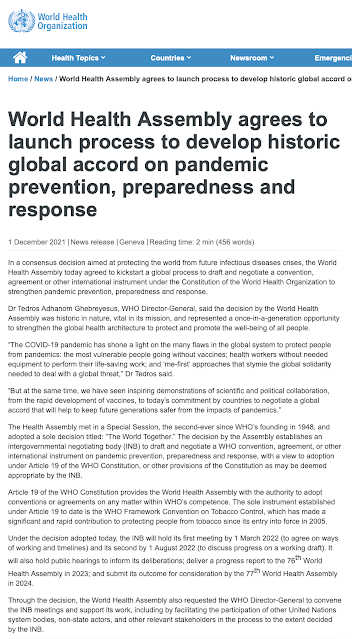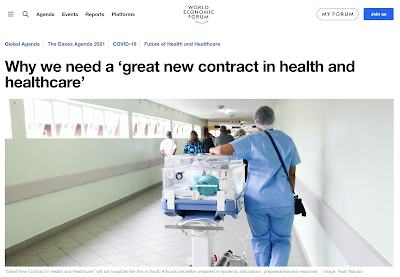With 2021 having been the year of the COVID-19 pandemic, let's close out this rather dystopic year with a look at what lies ahead for the world if the World Health Organization (aka the Bill Gates Health Organization) gets its way.
To very little fanfare, on November 28, 2021, the World Health Organization announced that a Special Session of the World Health Assembly had begun the process of establishing an intergovernmental body also known as an INB with the goal of addressing the gaps in preventing, preparing for and responding to health emergencies. This was only the second time that the Health Assembly had met in a Special Section since the WHO was founded in 1948. Here is the announcement:
Here's what the World Health Organization's Director-General had to say about the announcement:
"The COVID-19 pandemic has shone a light on the many flaws in the global system to protect people from pandemics: the most vulnerable people going without vaccines; health workers without needed equipment to perform their life-saving work; and ‘me-first’ approaches that stymie the global solidarity needed to deal with a global threat.
But at the same time, we have seen inspiring demonstrations of scientific and political collaboration, from the rapid development of vaccines, to today’s commitment by countries to negotiate a global accord that will help to keep future generations safer from the impacts of pandemics.”
He also stated in his opening remarks to the meeting that:
"COVID-19 has exposed and exacerbated fundamental weaknesses in the global architecture for pandemic preparedness and response: Complex and fragmented governance; Inadequate financing; and insufficient systems and tools. Voluntary mechanisms have not solved these challenges.
The best way we can address them is with a legally binding agreement between nations; an accord forged from the recognition that we have no future but a common future."
The agreement or convention will be adopted under Article 19 of the WHO Constitution which reads as follows:
"The Health Assembly shall have authority to adopt conventions or agreements with respect to any matter within the competence of the Organization. A two-thirds vote of the Health Assembly shall be required for the adoption of such conventions or agreements, which shall come into force for each Member when accepted by it in accordance with its constitutional processes..."
The only instrument established to date under Article 19 is the WHO Framework Convention on Tobacco Control which is dated in 2003 as shown here:
Let's now look at the Provisional Agenda from the World Health Assembly's Second Special Session as noted at the beginning of this posting:
Given the draconian response to the pandemic by certain nations, it isn't terribly surprising to see Australia, Canada, New Zealand, the United Kingdom and the United States among the nations proposing the establishment of an intergovernmental negotiating body for pandemic prevention, preparedness and response. It also is not surprising to see that the United Nations is using its World Health Organization to further promote its agenda of a global parliamentary body where national governments take a back seat to the diktats issued by a United Nations-led global government.
The INB will hold its first meeting by March 1, 2022 and its second by August 1, 2022 and will deliver a progress report to the 76th World Health Assembly in 2023
Here are some key excerpts from the establishing document:
1.) Acknowledging the need to address gaps in preventing, preparing for, and responding to health emergencies, including in development and distribution of, and unhindered, timely and equitable access to, medical countermeasures such as vaccines, therapeutics and diagnostics, as well as strengthening health systems and their resilience with a view to achieving UHC (universal health care).
2.) Emphasizing the need for a comprehensive and coherent approach to strengthen the global health architecture, and recognizing the commitment of Member States to develop a new instrument for pandemic prevention, preparedness and response with a whole-of-government and whole-of-society approach, prioritizing the need for equity.
3.) Stressing that Member States should guide their efforts to develop such an instrument by the principle of solidarity with all people and countries, that should frame practical actions to deal with both causes and consequences of pandemics and other health emergencies.
This legally binding treaty will give the World Health Organization unfettered powers during an outbreak of infectious disease. We need to remember that the WHO is substantially funded by Bill Gates, the world's self-annointed czar of vaccines (not to mention purveyor of flawed and virus-prone software) as well as its close links to the World Economic Forum, the purveyor the Great Reset and promoter of a "great new contract in health and healthcare" and its mantra of "building a new immune system for the world", another version of the WHO's global health accord as announced here:
...and quoted here which looks very much like the aims of the WHO's health accord (my bold):
"We count on the commitment of all Forum stakeholders to embrace the Great New Contract for Health and Healthcare and join the collaborative platform we will remember years from now for the positive impact it will make in the fields of epidemic anticipation, preparedness and response."
Under the new global health reality proposed by the WHO, the world's response to a future pandemic will be dictated to the world by a group of unelected health bureaucrats who do not necessarily hold the best interests of humanity at the forefront. It will be this group that will ultimately have control over the response to a future pandemic including the shuttering of businesses and schools, preventing us from socializing with family and friends, restricting travel and, perhaps most frightening of all, be responsible for the issuance and further implementation of a digital identification which will be used to control every aspect of our lives.
Happy 2022!












The World Health Organization - spawned from the United Nations - and a far more dangerous entity than its UN progenitor, as it is capable of purporting a 'genuine' R2P facade. It can be as ineffective as the UN - see page 44 Article 9 in the 2003 'WHO FRAMEWORK CONVENTION ON TOBACCO CONTROL' where "in consultation with competent international bodies,shall propose guidelines for testing and measuring the contents and emissions of tobacco products, and for the regulation of these contents and emissions" - which would never be allowed - so the unnecessary, added, poisonous and addictive filth in tobacco is ignored and unregulated.
ReplyDeleteBut the WHO appears easier to manage and manipulate than the sad sham of the UN.
USA Department of Defense awarding a $136.7 million contract to MilliporeSigma to make more of a key component of rapid Covid tests to boost their production... "that will take 3 years to build and will start producing 83.3 million tests a month in late 2024 at the earliest"
“We went from no over-the-counter tests in January to 46 million in October, 100 million in November and almost 200 million in December.” Biden said.
Hard to know how long this can be milked.